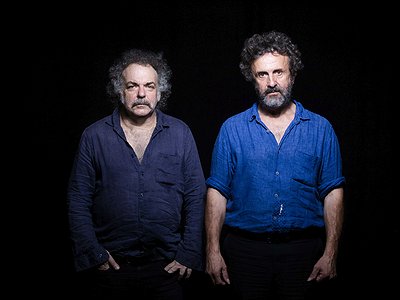Name: Xylouris White
Nationality: Australian (Jim White), Greek (George Xylouris)
Members: Jim White (drums), George Xylouris (vocals, laouto)
Current release: The new Xylouris White album The Forest In Me is out via Drag City.
Recommendations:
George: The temple of Posidon outside of Athens.
Jim: “Hare Krishna” by Alice Coltrane from the album Universal Consciousness. She has two songs with this title, I’m referring to the non chant one.
If you enjoyed this Xylouris White interview and would like to stay up to date with the duo and their music, visit their official website. They are also on Instagram, Facebook, and twitter.
I recorded some (to me) incredible pieces of music when I had almost no idea what I was doing. What were your very first steps in music like - and how do you rate gains made through experience versus the naiveté of those first steps?
Jim: Knowing what you are doing doesn’t seem that important in the first instance - or at any time - for me. What I learn over time, I hope for more of those moments and maximise them, especially in performance.
It is generally believed that we make our deepest and most incisive musical experiences between 13-16. Tell me what music meant to you at that age, please – and how its impact has changed since then.
George: I was a full time working musician from age 14 on, playing traditional Cretan music, following my dad playing nightclubs and squares around Crete. I was listening to a lot of traditional music and loved that and other music around Greece and also Jimmy Hendrix and Oum Kalthoum, Paco De Liucia.
When I heard this music I felt my soul in my chest.
Over the course of your development, what have been your most important instruments and tools - and how do you think has working with them shaped your perspective on music?
Jim: I love the formality of the drum kit and haven’t got sick of it yet.
What, would you say, are the key ideas behind your approach to music and what motivates you to create?
George: Why do I do it? I guess I was born to it. I have to do it every day.
Jim: To try to get that feeling and to get it.
Paul Simon has been quoted as claiming that “the way that I listen to my own records is not for the chords or the lyrics - my first impression is of the overall sound.” What's your own take on that and how would you define your personal sound?
George: I feel that, it’s the whole sounds.
My sound comes from the people before me, a finger-length piece of bamboo, with five holes, basic, dirt and water, barefoot dancing, those images have sound for me, and dust and breath …
Sound, song, and rhythm are all around us, from animal noises to forces of nature. What, if any, are some of the most moving experiences you've had with these non-human-made sounds? In how far would you describe them as “musical”?
George: Yes I do feel they are music, the quiet sound of nature: like the ocean and the forest - the leaves and quiet time in my room.
From very deep/high/loud/quiet sounds to very long/short/simple/complex compositions - are there extremes in music you feel drawn to and what response do they elicit?
George: Simple, deep and high. I try to put them together to reach the feeling.
From symphonies and traditional verse/chorus-songs to linear techno tracks and free jazz, there are myriads of ways to structure a piece of music. Which approaches work best for you – and why?
George: Free, but also the structure say of a dance, the meter, the circles make me feel free within that.
Jim: Simple, small idea.
George: Me too.
Science and art have certain overlaps and similarities. Do you you think "objectivity" has a place in art and do you conduct “experiments” or make use of scientific insights when you're making music?
Jim: I like to make experiments and also I imagine theories I’m expressing sometimes. But that’s because I like that stuff and I’m not saying it reflects it or that anyone would gain from knowing what I’m thinking about.
However I feel the fact that I’m thinking about something sometimes gives the music something.
Seeing, smelling, touching, tasting – which of these sense impressions have the strongest points of contact with your hearing/listening experience?
George: Seeing. Especially water.
Does the way you make music reflect on the way you live your life? And vice versa, can we learn lessons about life by understanding music on a deeper level?
Both: Of course. Everything does. Doesn’t everything go together?
Do you feel as though writing or performing a piece of music is inherently different from something like making a great cup of coffee? What do you express through music that you couldn't or wouldn't in more 'mundane' tasks?
Both: We like to have a coffee and play .
Every time I listen to "Albedo 0.39" by Vangelis, I choke up. But the lyrics are made up of nothing but numbers and values. Conversely, many popular love songs leave me cold. Do you have similar paradoxical examples - and why, do you think, is the same piece of music capable of conjuring such vastly different responses in different listeners?
Jim: What have the lyrics got to do with the feeling?
I don’t think it’s a paradox. Music's emotional, right?




